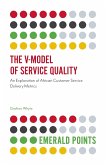Quality management practices are essential in any organization, and service organizations are no exception. Service organizations face unique challenges in maintaining and improving the quality of their services, including intangible outputs and a high degree of customer interaction. Effective quality management practices can help service organizations meet these challenges and achieve their quality objectives. Quality management practices in service organizations typically involve a structured approach to planning, implementing, and evaluating quality initiatives. This includes identifying and understanding customer needs and expectations, designing and implementing quality control measures, and continuously monitoring and improving the quality of services delivered. One of the most widely used quality management frameworks in service organizations is the Service Quality (SERVQUAL) model. This model involves measuring service quality across five dimensions: reliability, responsiveness, assurance, empathy, and tangibles. By using the SERVQUAL model, service organizations can identify areas where service quality is lacking and take corrective action. Other quality management practices that service organizations can adopt include ISO 9001 certification, Six Sigma, and Lean methodologies. These approaches involve data-driven problem-solving, continuous improvement, and a focus on customer satisfaction. By adopting these practices, service organizations can reduce costs, increase efficiency, and improve customer satisfaction. Effective quality management practices in service organizations require a culture of continuous improvement and a commitment to meeting customer needs and expectations. This involves effective communication, training and development of employees, and a willingness to embrace change. In summary, quality management practices in service organizations are essential for delivering high-quality services that meet customer needs and expectations. By adopting a structured approach to quality management, service organizations can continuously improve their services, reduce costs, and increase customer satisfaction.
Bitte wählen Sie Ihr Anliegen aus.
Rechnungen
Retourenschein anfordern
Bestellstatus
Storno









